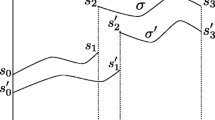Abstract
A general notion of bisimulation is studied for dynamical systems. An algebraic characterization of bisimulation together with an algorithm for computing the maximal bisimulation relation is derived using geometric control theory. Bisimulation of dynamical systems is shown to be a concept which unifies the system-theoretic concepts of state space equivalence and state space reduction, and which allows to study equivalence of systems with non-minimal state space dimension. The notion of bisimulation is especially powerful for ‘non-deterministic’ dynamical systems, and leads in this case to a notion of equivalence which is finer than equality of external behavior. Furthermore, by merging bisimulation of dynamical systems with bisimulation of concurrent processes a notion of structural bisimulation is developed for hybrid systems with continuous input and output variables.
Access this chapter
Tax calculation will be finalised at checkout
Purchases are for personal use only
Preview
Unable to display preview. Download preview PDF.
Similar content being viewed by others
References
Alur, R., Henzinger, T.A., Lafferriere, G., Pappas, G.J.: Discrete abstractions of hybrid systems. Proceedings of the IEEE 88, 971–984 (2000)
Basile, G., Marro, G.: Controlled and conditioned invariants in linear system theory. Prentice Hall, Englewood Cliffs (1992)
Haghverdi, E., Tabuada, P., Pappas, G.J.: Unifying bisimulation relations for discrete and continuous systems, Category Theory and Computer Science, Electronic Notes in Theoretical Computer Science (August 2002)
Henzinger, T.A.: Hybrid automata with finite bisimulations. In: Fülöp, Z., Gecseg, F. (eds.) ICALP 1995. LNCS, vol. 944, pp. 324–335. Springer, Heidelberg (1995)
Hermanns, H. (ed.): Interactive Markov Chains. LNCS, vol. 2428. Springer, Heidelberg (2002)
Lafferriere, G., Pappas, G.J., Sastry, S.: Hybrid systems with finite bisimulations. In: Antsaklis, P., Kohn, W., Lemmon, M., Nerode, A., Sastry, S. (eds.) Hybrid Systems V. LNCS, Springer, Heidelberg (1998)
Lafferriere, G., Pappas, G.J., Sastry, S.: O-minimal hybrid systems. Math. Contr. Signals, Syst. 13, 1–21 (2000)
Milner, R.: Communication and Concurrency. Prentice Hall International Series in Computer Science (1989)
Milner, R.: Communication and Mobile Systems: the π- Calculus. Cambridge University Press, Cambridge (1999)
Pappas, G.J., Lafferriere, G., Sastry, S.: Hierarchically consistent control systems. IEEE Transactions on Automatic Control 45(6), 1144–1160 (2000)
Pappas, G.J.: Bisimilar linear systems. Automatica 39, 2035–2047 (2003)
Pappas, G.J., Simic, S.: Consistent abstractions of affine control systems. IEEE Transactions on Automatic Control 47, 745–756 (2002)
Park, D.: Concurrency and automata on infinite sequences. In: Deussen, P. (ed.) GI-TCS 1981. LNCS, vol. 104, Springer, Heidelberg (1981)
Pola, G., van der Schaft, A.J., Di Benedetto, M.D.: Bisimulation theory for switching linear systems (in preparation)
van der Schaft, A.J.: Equivalence of dynamical systems by bisimulation., Technical Report Department of Applied Mathematics, University of Twente (October 2003) (submitted for publication)
van der Schaft, A.J., Schumacher, J.M.: An Introduction to Hybrid Dynamical Systems. Springer Lecture Notes in Control and Information Sciences, vol. 251. Springer, London (2000); Second revised edition to appear in Communications and Control Engineering Series, Springer, London (2004)
Tabuada, P., Pappas, G.J.: Bisimilar control affine systems. Systems and Control Letters (to appear)
Tabuada, P., Pappas, G.J., Lima, P.: Composing abstractions of hybrid systems. In: Tomlin, C., Greenstreet, M.R. (eds.) Hybrid Systems: Computation and Control. LNCS, pp. 436–450. Springer, Heidelberg (2002)
Wonham, W.M.: Linear multivariable control: a geometric approach, 3rd edn. Springer, New York (1985)
Author information
Authors and Affiliations
Editor information
Editors and Affiliations
Rights and permissions
Copyright information
© 2004 Springer-Verlag Berlin Heidelberg
About this paper
Cite this paper
van der Schaft, A. (2004). Bisimulation of Dynamical Systems. In: Alur, R., Pappas, G.J. (eds) Hybrid Systems: Computation and Control. HSCC 2004. Lecture Notes in Computer Science, vol 2993. Springer, Berlin, Heidelberg. https://doi.org/10.1007/978-3-540-24743-2_37
Download citation
DOI: https://doi.org/10.1007/978-3-540-24743-2_37
Publisher Name: Springer, Berlin, Heidelberg
Print ISBN: 978-3-540-21259-1
Online ISBN: 978-3-540-24743-2
eBook Packages: Springer Book Archive




